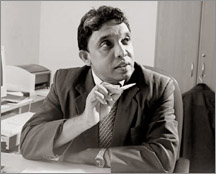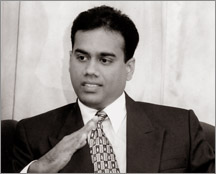|
observer |
|
|
|
|
|
OTHER LINKS |

|

|

|
Mixed reactions to tax proposals
Senior lecturer in Economics of the Colombo University Dr. Sirimal Abeyratne: Every year government budgets appear to have got different titles. This time it is a 'development budget'. I guess it has got this title, because first it has a focus on a 10-year development horizon and, secondly it has allocated a nearly 30% of government expenditure on public investment - the largest Capital expenditure share after the 1980s. Caltex Lanka (Pvt) Ltd Managing Director Kishu Gomes: The fact that main thrust of 2007 Budget in government expenditure is on infrastructure development, enhanced recognition for local value addition, duty exemptions for import of machinery and immediate relaxation of licensing requirements for heavy machinery in the construction industry and plantation sector, concessions proposed for Apparel and Textile and leather sector, incentives for rural farmers, exemption of electricity generation and distribution and to provide electricity at 7 US cents per unit to identified industries are ample evidence to suggest that it is a budget for long term growth of the economy. It was announced by the treasury secretary that there is 10 billion US dollars in the pipe line to fund various projects on attractive terms which is very positive. However, when analyzing our past performance in respect of utilization of these funds it raises concerns if the outcome of this years plan would be any better.
Development is not only about new investment it is also about managing existing investments profitably to realise a net benefit. Several government organisations such as Ceylon Petroleum Corporation, CEB, Railway and CTB are a huge drain on the economy which need to be confronted for an acceptable solution. Q: President Mahinda Rajapaksa in his budget speech appealed to the nation to sacrifice today for a bright future. What is your opinion? SA: As far as the development experience in the history of any developed country is concerned, at least one generation has sacrified for a better future. Even in Sri Lanka this is not a new thing, as such slogans were heard even in the 1960s and the 1970s but the better future got delayed because people sacrified for wrong policies. The President's appeal to the nation in the Budget 2007 is, however, is crucial as the budget focuses on spending more on development activities for which people will also have to pay more in the form of higher taxes. Even if the government borrows money to cover the budget deficit, still people have to repay the government debt with interest in the form of taxes. Secondly, people anticipate different forms of 'relief' from the budget which we do not see this time - a significant reversal of government's budgetary focus, if you remember the Budget last year. This is another form of sacrifice for a bright future. But if the government does not spend every tax rupee to get the best use of it without wasting and if policies and politics do not support it, the problem may come through sluggish growth performance and worsened macroeconomic fundamentals. Then you may feel that you have sacrificed for nothing. KG: Whatever the sentiments may be, thinking rationally, this is the only way forward to achieve a sustainable growth to provide a better economic climate for all stakeholders of our country. Though the country's economy has shown incredible resilience in the past we need to strengthen the economic fundamentals further to be able to effectively face volatile economic realties the global developments may dictate from time to time and also to elevate the living conditions of all, closing the gaps between haves and have-nots. Aim to increase per capita income up to 3000 US dollars is the right way forward. However, the detailed strategy, action and execution plan to achieve this is a dialog that's that is yet to take place. The topic of productivity improvement as a nation however is not discussed adequately as a strategy to create value. Re-structuring of loss making government commercial entities, productivity enhancement of department and corporation workers and more efficient administration system are areas needing attention as a platform for a brighter future. Q: How would the Government maintain the development goal of the 2007 budget while facing the increasing security threat from the Tigers? SA: An increase in any form of government spending will contribute to budget deficit at a time that Sri Lanka desperately wants to reduce it to a manageable level. Rising budget deficits damage growth prospects, affect cost of living and add to government debt - for all these things people have to pay in the future. As far as this particular spending on defence is concerned, people have to pay again directly or indirectly to meet the costs of war. KG: This has been identified as the biggest barrier to development. Over the last several years economic analysts attribute a 2% drop in GDP growth as a consequence. Hostilities erupted in the first quarter 2006 and the third and fourth quarters experienced major security threats bringing down the confidence of all stakeholders. However in reality what we have seen so far is improved performance by business organisations across all industries and thats reflected in the GDP growth over 7% recorded year to date. Increased defence budget will hopefully ensure a similar security environment with a managable level of distruptions to implement plans. With the declining trend of crude oil in the global market a repeat of this years performance in 2007 though challenging one can argue that it is achievable. However the importance of getting the maximum from the North and East through cross transactional economic activities is an important factor to drive the overall growth. Q: Under prevailing conditions, will the government be able to maintain a 7.5% budget deficit as estimated in the budget? SA: Our historical records show that most of the time the actual budget deficits have been above the estimates. Maintaining budget deficit at 7.5% of GDP requires only one thing: raise denominator (GDP) without allowing an increase in expenditure. But both are quite challenging. Raising GDP to sustainable 7-8% requires a substantial improvement in the investment-friendly climate of the country. Actual expenditure figures, particularly those on recurrent spending, have outnumbered budgetary estimates in the past. KG: We have in the past miserably failed to hit the revenue targets and in the backdrop of this, the revenue target of Rs 584 billion seems very ambitious. This is not due to poor planning but our inability to implement plans timely and effectively. Government's plan to expand the tax net has not met with success in the past that has led to introduction of new taxes on people and organizations that already pay taxes. On the other hand the attempts made in the past to transform loss making government corporation to profit making have not been fruitful. However, there are many opportunities if explored, can bring about positive results. Oil exploration on a fast track to ease off the oil bill pressure, quality foreign jobs for Sri-Lankans as against the pathetic jobs currently done by the majority. Elevating the professional standards and preparing the workforce for ever increasing demand for young professionals in the BPO sector (Business Process Outsourcing)locally are some examples to manage the deficit to add to more obvious and significant ways such as controlling government and defense expenditure and accelerated foreign investment etc. Q: What are your views on the government's focus on 2007-2009 medium and 10 year long term development plan? SA: The 10-Year National Development Strategy is only a 'vision' of the government and not a 'Development Plan' or not even a 'strategy'. It is however necessary to have a 'vision' for a government, a country, an institution, a household and, even an individual - the 'vision' shows your dream that you are wishing to come true. Then you should have a 'mission' to make it come true. I do not know whether this 10-Year Strategy shows its mission, which obviously cannot be in an annual budget of a government. Then, there is also a medium-term framework which is not consistent with what is envisaged in the long-term strategy. KG: This is a very welcome development especially considering the focus areas which needs long term investment and commitment. If there is political consensus to treat this as the blue print in terms of direction with provision for tactical moves and adjustments based on evolving external factors we can get closer to the target relatively easily. Q: Government emphasised major infrastructure development and has allocated a large of money but most of these projects have been in the pipe-line for a long period. Do you think these projects will get off the ground during 2007? SA: Sri Lanka's infrastructure is a backlog of accumulated problems which has become a bottleneck to rapid growth of the economy. It is good that its urgent need has been addressed in the budget. The fact is that, however, the spending capacity of the State machinery has become so weak. Even though such large investment projects as Mahaweli were completed within a few years in the past, now it takes years and perhaps decades for an investment project to get off the ground. As long as this fundamental problem is not addressed, what can an annual budget do? KG: Our track record doesn't suggest that we will do this but with the new political consensus and increased pressure by both internal and external stakeholders, learning from past experience will help the government in the process of implementation. Q: Do you see any changes in the tax policy in the budget and if so how would they affect the corporate sector? SA: Apparently there can be mixed reactions to the tax proposals from the sections that are affected by these revisions. What is important is that our tax system needs to be improved with low tax rates and wide tax base along with substantial changes in direct and indirect tax revenue shares. There are sporadic indications in the budget, but definitely Sri Lanka has a long way to go in raising the tax revenue and assisting the growth momentum. KG: Tax policy has not changed but an escalation of duty and taxes is seen that will affect the performance of businesses. Increase of Port and Airport levy by 0.5% will affect all the businesses that use the port facilities. Though the percentage is small the absolute impact can be a major challenge for some businesses and also several targeted duty increases have been imposed under CESS and Excise Tax. |
 Q: Government has named budget 2007 as a development budget. How
do you analyse it?
Q: Government has named budget 2007 as a development budget. How
do you analyse it? 









